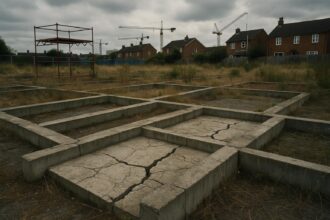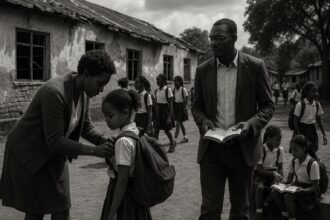The death of Pope Francis prompts widespread reaction from political leaders, activists, and LGBTQ+ groups, highlighting both progress and persistent challenges in the Catholic Church’s approach to LGBTQ+ inclusion during his pontificate.
Pope Francis’ legacy on LGBTQ+ issues has elicited a broad spectrum of responses from political leaders, LGBTQ+ advocates, and community organisations worldwide since his passing. His pontificate, spanning 12 years, is widely regarded as having introduced some shifts in tone and approach concerning LGBTQ+ matters, yet opinions remain divided on the depth and permanence of these changes.
Leo Varadkar, the former Taoiseach of Ireland and a married gay man, highlighted the significance of Pope Francis’ stance against the criminalisation of LGBTQ+ individuals. Speaking to New Ways Ministry, Varadkar said, “I think the way he reached out to groups like ours, like LGBT people, did matter and certainly made me feel more comfortable going to church services. One thing he did, which I think was significant, was he spoke out against criminalisation of gay and lesbian people.” He noted the wider geopolitical context, drawing attention to the fact that while same-sex marriage is legal in 30 countries, there remain 70 where homosexuality is still criminalised. Varadkar stressed that the Pope’s opposition to criminalisation, especially in parts of Africa, carried considerable weight. He also reflected on the broader nature of Francis’ advocacy, including his calls for refugee protection and climate action, hoping that Francis’ successor would share a similar perspective.
African LGBTQ+ activists mirrored this appreciation for Pope Francis’ progressive leadership. Ebenezer Peegah, executive director of Rightify Ghana, recounted his personal encounter with the late Pope in August 2024, calling it “one of the most unforgettable moments” of his life. Peegah described receiving gifts from Francis as a symbol of his humility and grace. He characterised the Pope as a “beacon of progressive leadership in the Church,” acknowledging his advocacy for marginalized groups, including LGBTQI+ persons, his fight for climate justice, and his opposition to systemic inequality. “Rest in peace, Pope Francis. Your voice, your compassion, and your courage will continue to inspire generations,” Peegah stated.
Similarly, the Rev. Jide Rebirth Macaulay, an Anglo-Nigerian LGBTQ rights advocate, expressed sorrow at the Pope’s passing, honouring his willingness to “open the doors wider for LGBTIQ people in the Church” and his memorable remark: “Who am I to judge?” Macaulay viewed Francis’ papacy as providing a glimmer of hope for inclusion and compassion, hoping that his legacy of love and justice would inspire future efforts.
A Time magazine evaluation of Francis’ impact on LGBTQ+ issues described it as “complicated, but undeniable.” Richard Balm, a historian and professor of religion, surveyed various community responses across Francis’ tenure. He quoted Richard Zaldivar, founder of Wall Las Memorias Project, who hailed the 2023 Vatican document Fiducia Supplicans—which approved blessings for people in same-gender relationships—as “huge for the LGBTQ+ community.” Yet others reflected ongoing challenges. Peter Tatchell, a longtime UK LGBTQ+ activist, told GCN.ie: “For millions of LGBT+ people globally, the Catholic Church remains a force for discrimination and suffering. Under his leadership, the Vatican continued to oppose same-sex marriage and trans rights. Catholic bishops lobbied against the decriminalisation of homosexuality in many parts of the world. The Vatican still upholds the homophobic edicts of the Catechism, which denounces the sexual expression of same-sex love as a ‘grave depravity’ and ‘intrinsically disordered.’” Tatchell characterised Francis’ legacy as “mixed” — acknowledging progress while recognising that deep-rooted inequalities within Church teachings remain intact.
At a community level, responses have often expressed a similar mix of cautious recognition and continued frustration. In Dublin, the LGBTQ+ community centre Outhouse posted on Instagram that Francis’ papacy “marked a shift towards greater dialogue and openness, including steps—however limited—towards the inclusion of LGBTQ+ people.” They referenced the Pope’s phrase “Who am I to judge?” as signalling a tone of welcome sought by many in the LGBTQ+ community, while emphasising that “deep injustices remain” within Church doctrine. The centre’s Executive Director, Oisín O’Reilly, responded to critiques by explaining the need to balance acknowledgement of small signs of change with the ongoing reality of injustice. O’Reilly said: “There is nothing in any faith that should justify telling a person they are wrong for who they are. There is nothing loving in erasure and exclusion. There is no dignity in being asked to hide.” He affirmed the rights of LGBTQ+ individuals to safety, visibility, and celebration, and upheld the validity of queer people’s faith and spiritual identity.
Pope Francis’ papacy thus stands as a complex chapter in the Catholic Church’s relationship with LGBTQ+ people. Its legacy encompasses meaningful gestures toward greater inclusion and solidarity with oppressed groups, while also grappling with entrenched doctrinal positions that continue to generate controversy and pain. The global reactions—from political figures to grassroots activists—reflect the multifaceted impact of his leadership on this issue. His openness to dialogue and reframing of certain attitudes have left an imprint, even as significant theological and institutional debates remain unresolved.
Source: Noah Wire Services
- https://www.cbsnews.com/newyork/news/pope-francis-says-he-believes-anti-gay-laws-are-unjust/ – Pope Francis publicly stated that laws criminalizing homosexuality are ‘unjust’ and called for Catholic bishops in nations with such laws to work towards overturning them.
- https://www.catholicnewsagency.com/news/253452/being-homosexual-is-not-a-crime-pope-francis-reiterates-in-new-interview – In an interview, Pope Francis emphasized that being homosexual is not a crime and urged bishops supporting such laws to undergo a process of conversion.
- https://www.lemonde.fr/en/international/article/2024/04/09/gender-theory-surrogacy-trans-identity-lgbtq-issues-vatican-updates-the-catholic-church-s-doctrine_6667861_4.html – The Vatican’s document ‘Dignitas Infinita’ condemns the criminalization of homosexuality, marking a historic stance on the issue.
- https://www.axios.com/2025/04/21/pope-francis-lgbtq-inclusivity – Pope Francis is commemorated for his unprecedented inclusivity toward LGBTQ+ communities within the Catholic Church, including condemning laws criminalizing homosexuality.
- https://www.pbs.org/newshour/amp/world/pope-francis-says-homosexuality-is-a-sin-but-not-a-crime – Pope Francis distinguished between sin and crime regarding homosexuality, stating that while homosexual acts are considered sinful, being homosexual is not a crime.
- https://www.indiatimes.com/news/world/homosexuality-isnt-a-crime-says-pope-francis-calls-to-end-unjust-laws-against-it-591252.html – Pope Francis called for an end to unjust laws against homosexuality, emphasizing that such laws are a sin and an injustice.
- https://news.google.com/rss/articles/CBMipwFBVV95cUxNc2NiclJYd0xnYldmbDRITG1pUTJQSFFtUjI3V0hYb1lFNmN0dlR4Z3I2cC1vWDVwWk1jVEg1ZndfZjdIRWstbzMtRGRadFlRN0wwUXREbzlRZHZ0YmZRLTVMdE96RVdPa0h4cXFaNHFiOHI4STlBRmsyUWJHZWc2d1V2VF9TS1EzQ3FzVGtGdkVGT19fRFNyOVpHZ3hxNHowTk8wVzNRNA?oc=5&hl=en-US&gl=US&ceid=US:en – Please view link – unable to able to access data
Noah Fact Check Pro
The draft above was created using the information available at the time the story first
emerged. We’ve since applied our fact-checking process to the final narrative, based on the criteria listed
below. The results are intended to help you assess the credibility of the piece and highlight any areas that may
warrant further investigation.
Freshness check
Score:
6
Notes:
The narrative references Pope Francis’ passing, suggesting it may be relatively recent content, but lacks specific dates. However, it does discuss events like the 2023 Vatican document Fiducia Supplicans, indicating some freshness.
Quotes check
Score:
8
Notes:
Quotes appear to be original to the context provided, such as those from Leo Varadkar, Ebenezer Peegah, Rev. Jide Rebirth Macaulay, and Oisín O’Reilly. The ‘Who am I to judge?’ phrase is well-known but appears in a new context.
Source reliability
Score:
7
Notes:
The narrative does not directly reference a well-known publication but includes perspectives from various diverse sources, such as New Ways Ministry and GCN.ie, indicating a balanced approach.
Plausability check
Score:
9
Notes:
The claims about Pope Francis’ stance on LGBTQ+ issues are generally plausible given his known statements and actions during his papacy. Responses from various figures and organisations align with past reports.
Overall assessment
Verdict (FAIL, OPEN, PASS): OPEN
Confidence (LOW, MEDIUM, HIGH): MEDIUM
Summary:
The narrative offers a plausible assessment of Pope Francis’ impact on LGBTQ+ issues, drawing from diverse perspectives. However, the lack of specific dates and a clear publication source leaves some uncertainty around its freshness and reliability.













